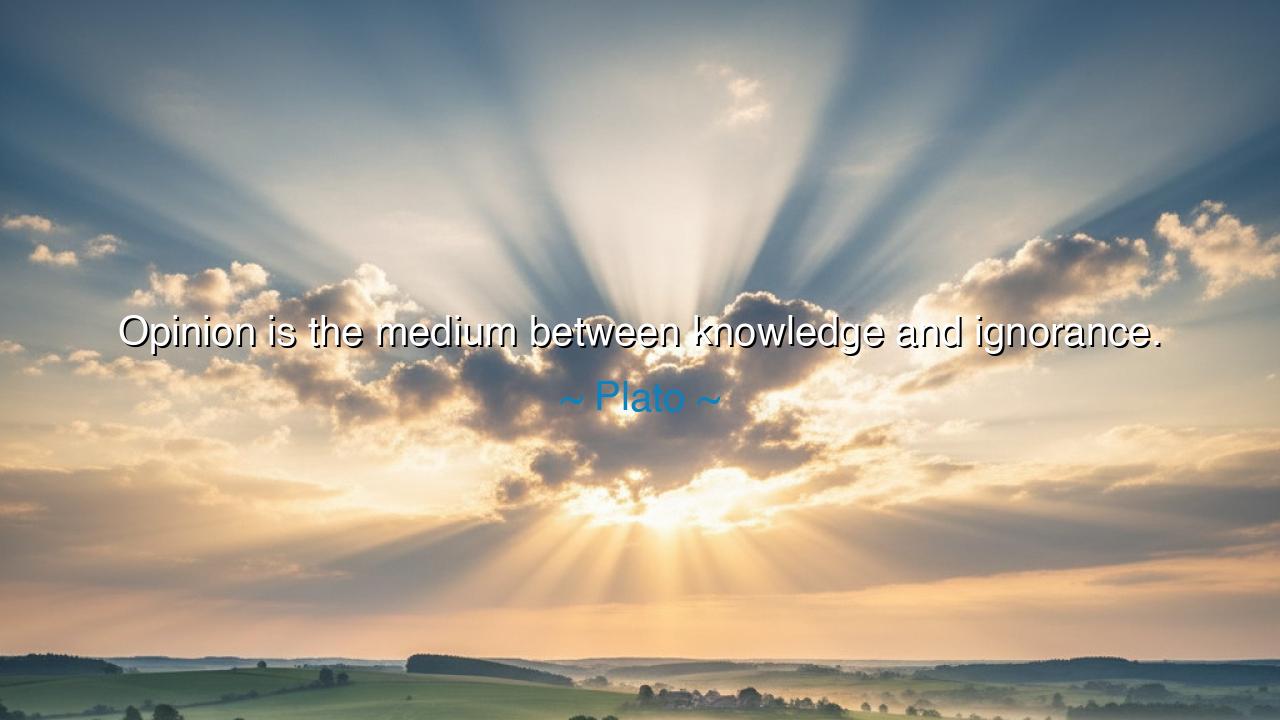
Opinion is the medium between knowledge and ignorance.






Hear now the timeless wisdom of the philosopher-king of Athens, Plato, who declared: “Opinion is the medium between knowledge and ignorance.” In these words is a vision of the human soul stretched between two realms. At one end lies knowledge, the radiant light of truth, firm, tested, and unchanging. At the other lies ignorance, the thick darkness of unawareness, where men stumble blindly. Between these two states lies opinion, a twilight land where light and shadow mingle, where truth is half-seen and half-concealed.
To understand this, we must remember that opinion is not worthless, but neither is it the summit of wisdom. It is the bridge, the crossing point, the middle ground. When a man forms an opinion, he stands above ignorance, for he at least perceives some fragment of truth. Yet he has not reached the firm shore of knowledge, for opinion is untested, uncertain, and subject to the winds of persuasion. Just as a sailor may see the outline of land through the morning mist but not yet set foot upon it, so opinion shows us possibility without yet granting certainty.
Think of the tale of Christopher Columbus. He held the opinion that the earth could be crossed westward to reach the riches of Asia. It was neither sheer ignorance—he was guided by charts, stars, and reasoning—nor true knowledge, for he did not know of the vast continent that lay between. His opinion carried him across the ocean, and though mistaken in its object, it opened a new world to history. Thus opinion, though fragile, can lead to discoveries, for it is the restless middle child between the blindness of ignorance and the discipline of knowledge.
But beware, for opinion can also enslave if mistaken for final truth. Entire nations have been led into ruin when men clung to opinion as though it were knowledge. The medieval belief that illness was caused by evil spirits delayed the understanding of medicine. The opinion seemed plausible to many, but it was not tested, not proven. Only when true knowledge emerged—through study, through experiment, through courage to challenge false belief—did humanity gain the power to heal. Here lies Plato’s warning: opinion may inspire, but it may also mislead, unless carried forward toward the light of truth.
The lesson is that every man and woman must learn to discern the steps of the soul: to recognize when they dwell in ignorance, when they stand upon the shaky ground of opinion, and when they have ascended to the solid heights of knowledge. Do not despise opinion, for it can be the seed of learning. But do not exalt it above its station, for it is only the path, not the destination. A wise person treats opinion as a beginning, not an end.
What then should the seekers of wisdom do? First, they must humbly admit their ignorance where it exists, for pride blinds the eyes. Next, they must form opinions with courage, for to venture into uncertainty is the first step out of darkness. But above all, they must test these opinions, refining them with reason, dialogue, and experience, until what remains is not fleeting guesswork but firm knowledge. Thus the soul climbs steadily, rung by rung, from shadow into light.
Therefore, beloved listeners, let Plato’s words guide your journey. Honor your opinions, but do not chain yourself to them. Seek discussion, seek evidence, seek the fire of truth that tempers the fragile metal of belief into the steel of knowledge. And remember always: opinion is the medium between knowledge and ignorance—a place to pass through, not to remain. Walk upon this bridge, but do not build your home upon it, for the true dwelling of the soul is found only in the radiant fields of wisdom.






AAdministratorAdministrator
Welcome, honored guests. Please leave a comment, we will respond soon